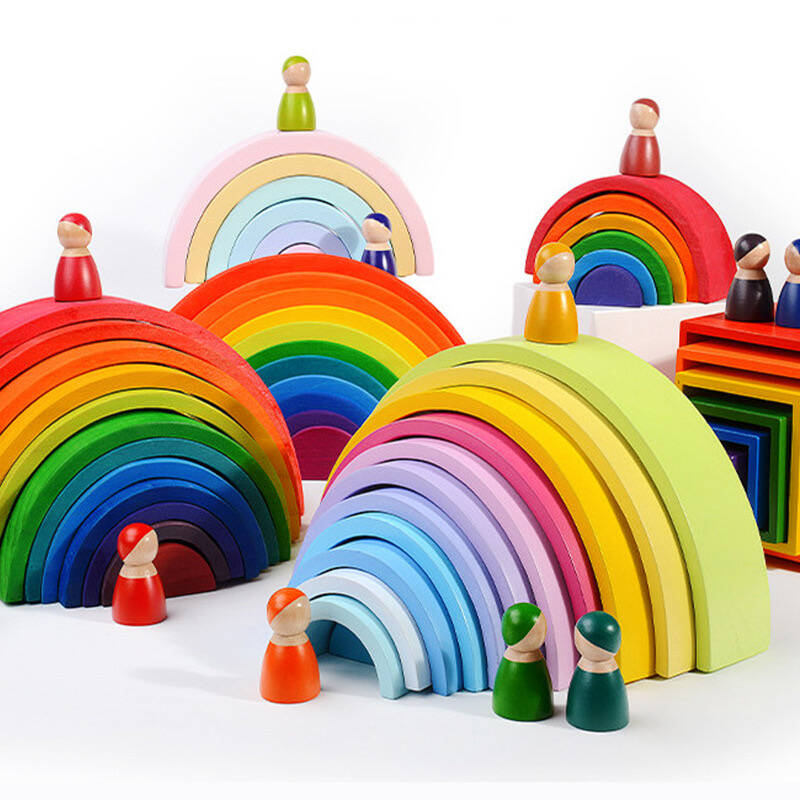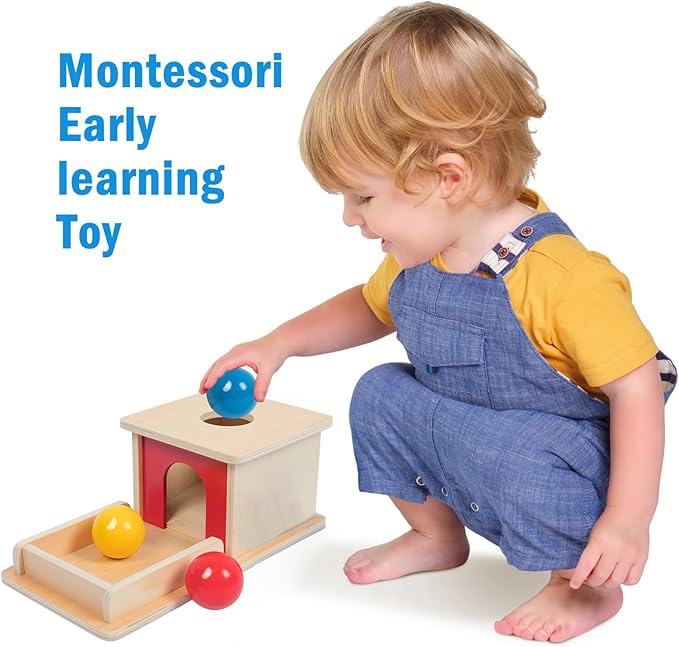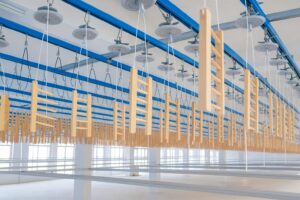Do Montessori Play Kits Support Early Learning and Development?
You want to give your child the best start in life. But the toy market is full of confusing claims, leaving you unsure which products truly support healthy development.
Yes, Montessori play kits are specifically designed to support early learning and development. They provide targeted, hands-on tools that foster cognitive growth, focus, and independence in young children.

In my line of work manufacturing wooden toys, I see a clear and growing demand for products with real purpose. Professional buyers I work with, like Sophia from a top European brand, don’t just look for something fun; they look for something effective. We often discuss how a well-designed toy is essentially an educational tool. Montessori kits are the perfect example of this. They are not just random assortments of toys. They are carefully engineered systems based on decades of research into how a child’s brain actually develops. Their power isn’t in flashy features, but in their quiet ability to unlock a child’s natural potential.
How do Montessori materials promote cognitive development?
You want your child to develop strong thinking and problem-solving skills. But many toys seem to overstimulate rather than teach real, foundational logic.
Montessori materials promote cognitive development by isolating one single concept at a time. This clarity helps a child organize their world and build mental models for logic and order.

The genius of the Montessori approach is its simplicity. Instead of confusing a child with a toy that does ten things at once, a Montessori material does one thing perfectly. This singular focus is what allows a child’s brain to grasp a new concept fully. For example, a set of stacking rings isn’t just about making a tower; its main job is to teach the concept of "size." When we manufacture these toys, we ensure the only variable that changes is the one being taught. The color, texture, and shape of the rings are all the same; only the diameter is different. This deliberate design removes all other distractions. It allows the child to concentrate on and master a single abstract idea, like big versus small, in a very concrete, hands-on way. This builds the fundamental mental architecture needed for all future learning, especially in math and science.
| Montessori Material | Core Cognitive Skill Learned |
|---|---|
| Object Permanence Box | Understanding that objects exist even when they can’t be seen. |
| Stacking Rings | Learning seriation (ordering items by size). |
| Knobbed Puzzles | Developing visual discrimination and shape recognition. |
Can Montessori play kits help improve focus and independence?
Your child has a short attention span, jumping from one toy to the next. You worry they’ll struggle to concentrate as they get older in our busy world.
Absolutely. Montessori kits are specifically designed to cultivate deep focus and independence. Their self-correcting nature lets a child succeed on their own, building confidence and concentration.

The ability to focus is a skill, and like any skill, it needs to be practiced. Montessori toys are the perfect gym for the brain’s "attention muscle." The secret is a feature called "control of error." This means the toy itself provides feedback, not an adult. Imagine a puzzle where each piece has only one possible slot it can fit into. If the child tries the wrong one, it won’t go in. They don’t need a parent to say "no, try again." The puzzle’s design guides them to the correct solution. This removes any sense of failure or pressure from the parent. It empowers the child to become a problem-solver. This process is intensely satisfying for a child and builds an incredible sense of "I did it myself!" This feeling of competence is the foundation of independence and what encourages a child to sit and work at a task for extended periods.
How do these kits encourage sensory exploration and problem-solving?
You know that children learn best through their hands. But you notice many popular toys are made from sterile, uninteresting plastic that offers little real-world feedback.
These kits are a feast for the senses. They use natural materials like wood and metal, whose textures and weights invite exploration. This sensory feedback directly helps in solving the toy’s puzzle.

Sensory learning is not just about feeling different things; it’s about the brain taking in information through the senses to understand the world. This is where the choice of material is so critical. As a manufacturer, I insist on using solid wood because its weight, temperature, and texture provide rich, authentic feedback. A wooden block has substance; it feels different from a hollow plastic one. When a child holds two different-sized wooden blocks, they can literally feel the difference in weight, which reinforces the visual lesson about size. Every toy presents a small problem: How do these shapes fit? How do I thread this bead? The child uses the sensory information they are gathering—the feel of the smooth edges, the sound it makes when it drops, the sight of the correct hole—to solve the problem. The hands and the brain work together in a beautiful, integrated loop of discovery.
Are Montessori kits beneficial for children with developmental differences?
You are looking for the best tools to support your child’s unique way of learning. Finding resources that are calming, effective, and respectful can be a challenge.
Yes, Montessori kits are exceptionally beneficial. Their predictable, orderly nature and single-task focus create a calming and empowering learning environment for children with diverse developmental needs.

The structure of Montessori materials makes them a powerful tool in therapeutic and special education settings. I have many clients who are occupational therapists or work in early intervention programs, and they specifically seek out these toys. The reason is simple: they work. For a child on the autism spectrum, for example, the predictability and logic of a material like the Pink Tower can be incredibly comforting. There are no sudden noises or flashing lights to cause sensory overload. For a child with ADHD, the single, clear purpose of a toy helps direct and sustain their focus. The self-correcting design is also key; it provides immediate, non-judgmental feedback, which helps build resilience and self-esteem without the social anxiety of being corrected by an adult. The hands-on, self-paced nature respects the child’s individual rhythm, allowing them to learn and succeed in a way that feels safe and supportive.
What do teachers and child development experts say about their impact?
You see Montessori kits advertised everywhere. You wonder if the educational claims are just good marketing or if they are truly backed by professionals.
Teachers, therapists, and child development experts overwhelmingly endorse the Montessori method. They praise the materials for their proven ability to build independence, concentration, and a genuine love for learning.

The consensus among professionals is clear and consistent. For over a century, educators have seen the results firsthand in classrooms around the world. Teachers often report that children in Montessori environments are more self-reliant, collaborative, and better at managing their time because they have been empowered to take charge of their own learning from a young age. Child psychologists and developmental experts point to how closely the materials align with the natural, universal stages of child development. The sequence of the materials perfectly matches the sequence in which a child’s brain is ready to learn new skills. This isn’t an accident; it is the result of Dr. Montessori’s rigorous scientific observation. When I discuss product development with experts, they confirm that these toys are effective precisely because they don’t try to speed up learning. Instead, they respect the child’s own timetable, providing the right challenge at the right time.
How do Montessori play kits integrate with homeschooling curriculums?
You have chosen to homeschool your young child. The task of creating an engaging and effective curriculum from scratch feels monumental and overwhelming.
Montessori kits integrate seamlessly into a homeschool curriculum. They essentially become the curriculum, providing the hands-on, child-directed learning materials that form the core of the Montessori educational method.

For homeschooling parents, these kits can be a complete game-changer. They provide the structure and materials for a comprehensive early-years education without requiring the parent to be a traditional "teacher." The parent’s role shifts to that of a "guide." Your job is to create the "prepared environment"—a calm, orderly space—and to carefully observe your child. Based on their interests and readiness, you introduce a new material from the kit. The toy itself then does the teaching. This approach honors a child’s natural curiosity and allows them to learn at their own pace.
| Curriculum Area | Example Kit Activity |
|---|---|
| Practical Life | Pouring water, buttoning frames, transferring objects with tongs. |
| Sensorial | Sorting color tablets, building with the Pink Tower, feeling texture boards. |
| Language | Tracing sandpaper letters, matching picture cards. |
| Mathematics | Counting with number rods, sorting objects by quantity. |
These kits provide a well-rounded, hands-on curriculum that covers all the essential areas of early development, making homeschooling less about lesson plans and more about guided discovery.
Conclusion
Montessori play kits are a proven, effective investment in your child’s future. They directly support learning and development by nurturing a child’s natural ability to explore, concentrate, and learn independently.












